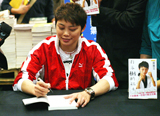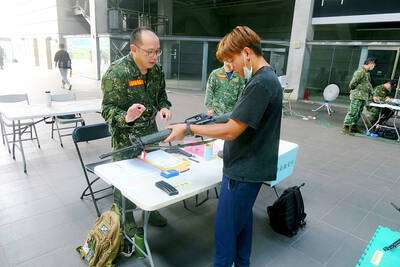She won the taekwondo championship in 2006 Asian Games in Doha, finished first in the 2007 Summer Universade and brought home a gold from the 2008 Asian Taekwondo Championship. But after Aug. 21 last year, Su Li-wen (蘇麗文) has been largely remembered as the national heroine who, despite falling to the ground 11 times, continued to fight until her coach carried her out of the ring in the Beijing Olympics.
Su published her first book last month. A Tough Kid (打不倒的孩子) chronicles Su’s pursuit of success over the past 18 years, based on the journals she kept while she was in graduate school. She did some of the illustrations as well.
“I hope my story can inspire people,” she said.

PHOTO: SUN CHUAN-HSIAN, TAIPEI TIMES
The fact that she did not get the perfect ending she hoped, and is still paying the price for losing one of the most important games in her life — a torn anterior cruciate ligament, a fractured toe on her left foot and a wrecked triangular fibro — has not dimmed her quest for an Olympic gold.
“I just don’t believe that that was it,” said Su in an interview with the Taipei Times.
The day before she was interviewed, Su visited National Taiwan University Hospital to get a shot for her injuries.
“I always think that the day I announce my retirement will be the day I feel I have reached the limits of my capacity,” she said. “I haven’t felt that way yet.”
But Su was not always such a tenacious fighter. A skinny child who was often in ill health, Su said she took taekwondo lessons because her parents hoped she would grow stronger through sports.
The training was grueling, Su recalled, and her brother quit after only three classes. Su persevered because she enjoyed the progress she made, and the feeling she had after conquering seemingly unbeatable foes.
“After you beat one of your strongest classmates, you start setting the goal of becoming a national champion. Then you want to take the next step to an international tournament. And the next thing you know you want to enter a global contest,” she said.
Taekwondo not only gave Su a healthier physique, but also channeled her youthful energy into discipline, she said.
During junior high, however, she thought about giving up the sport because of her lackluster performance in competition.
“I was not interested in school at all, but I was not doing well in takwondo either,” she said.
“My parents thought I was wasting my time on things that might eventually get me nowhere. They wanted me to concentrate on my studies instead,” she said.
Nonetheless, she remained active in sports and even at one point played on her school’s girls softball team.
Su continued her studies at the Taipei Physical Education Junior College, Taichung Physical Education College and National Chung Cheng University, where she trained as a national team athlete.
However, as an undergraduate, she supported herself by working three jobs.
The path to the Olympics was not an easy one for Su. She failed in her bid for the 2000 Sydney Olympics, losing to two-time Olympic Gold medalist Ann Chen (陳怡安). One of Su’s contacts fell out during the fight, blurring her vision and making her lose concentration.
She lost out on the 2004 Athens Olympics after the national team picked Chi Shu-ju (紀淑如) over her.
By the time she was chosen to represent the nation at last year’s Olympics, Su was 28 and many thought she was past her prime as an athlete. Her father had also been diagnosed with terminal nasopharyngeal cancer.
The bronze medal match was a very painful process, Su said.
“I tried to figure out how to stand on one leg and score the last point,” she said. “I was in so much pain. I bit my teeth so hard that a tooth cap broke and my gums bled.”
“I hardly cried, but when I saw my opponent score, which I thought she shouldn’t have because she only hit my hand, I couldn’t help but break into tears,” she said.
Su said she watches the match on YouTube with her friends from time to time, adding that she can’t believe that it was her in the match.
Although she finished fifth in the Beijing Games, the worldwide praise she garnered won her job offers from all three of her alma maters and one from National Taiwan Normal University to teach in their sports programs.
“People think NT$3 million [her prize from the government] was a lot of money, but it’s nothing if you add up payments for taekwondo lessons, or medical bills for injuries accumulated over the years — before and after there was a national health insurance program,” she said, commenting on requests by the parents of weightlifting bronze medalists Chen Wei-ling (陳葦綾) and Lu Ying-chi (盧映錡) for Premier Liu Chao-hsiun (劉兆玄) and President Ma Ying-jeou (馬英九) to help their children find jobs.
She said she considered herself one of the fortunate few who were able to compete in the Olympics and retire without worrying about what she was going to do next.
Many of her college classmates were working as waiters or store clerks because there weren’t many companies that would hire sports college graduates, she said.
Su accepted the offer from her alma mater in Taichung, which is now called National Taiwan Sports University, Taichung Campus, because “it has more athletes training for the national teams” and she wants pass on her experience in international competition.
Asked to comment on billiard prodigy Wu Chia-ching’s (吳珈慶) decision to apply for Singaporean citizenship because the city-state promised him more than what the Chinese-Taipei Billiard Association could offer, and golfer Tseng Ya-ni’s (曾雅妮) appeal for the government to pay more attention to her sport, Su said: “I am more concerned about whether I have done my best as an athlete than about the government resources I can get.”

A magnitude 6.4 earthquake struck off the coast of Hualien County in eastern Taiwan at 7pm yesterday, the Central Weather Administration (CWA) said. The epicenter of the temblor was at sea, about 69.9km south of Hualien County Hall, at a depth of 30.9km, it said. There were no immediate reports of damage resulting from the quake. The earthquake’s intensity, which gauges the actual effect of a temblor, was highest in Taitung County’s Changbin Township (長濱), where it measured 5 on Taiwan’s seven-tier intensity scale. The quake also measured an intensity of 4 in Hualien, Nantou, Chiayi, Yunlin, Changhua and Miaoli counties, as well as

Credit departments of farmers’ and fishers’ associations blocked a total of more than NT$180 million (US$6.01 million) from being lost to scams last year, National Police Agency (NPA) data showed. The Agricultural Finance Agency (AFA) said last week that staff of farmers’ and fishers’ associations’ credit departments are required to implement fraud prevention measures when they serve clients at the counter. They would ask clients about personal financial management activities whenever they suspect there might be a fraud situation, and would immediately report the incident to local authorities, which would send police officers to the site to help, it said. NPA data showed

ENERGY RESILIENCE: Although Alaska is open for investments, Taiwan is sourcing its gas from the Middle East, and the sea routes carry risks, Ho Cheng-hui said US government officials’ high-profile reception of a Taiwanese representative at the Alaska Sustainable Energy Conference indicated the emergence of an Indo-Pacific energy resilience alliance, an academic said. Presidential Office Secretary-General Pan Men-an (潘孟安) attended the conference in Alaska on Thursday last week at the invitation of the US government. Pan visited oil and gas facilities with senior US officials, including US Secretary of the Interior Doug Burgum, US Secretary of Energy Chris Wright, Alaska Governor Mike Dunleavy and US Senator Daniel Sullivan. Pan attending the conference on behalf of President William Lai (賴清德) shows a significant elevation in diplomatic representation,

The Taipei City Reserve Command yesterday initiated its first-ever 14-day recall of some of the city’s civilian service reservists, who are to undergo additional training on top of refresher courses. The command said that it rented sites in Neihu District (內湖), including the Taipei Tennis Center, for the duration of the camp to optimize tactical positioning and accommodate the size of the battalion of reservists. A battalion is made up of four companies of more than 200 reservists each, it said. Aside from shooting drills at a range in New Taipei City’s Linkou District (林口), the remainder of the training would be at